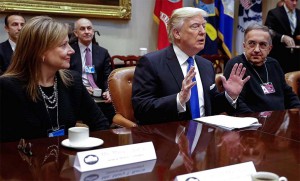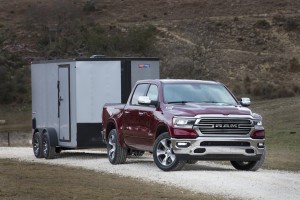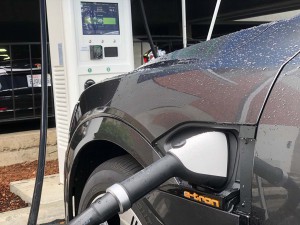
Pres. Donald Trump thought he would win industry support from industry leaders over CAFE cuts but has seen opposition, instead/
In an unusual move, 17 automakers, including giants General Motors, Ford and Toyota, have sent a letter to President Donald Trump urging him not to move ahead on plans to roll back federal fuel economy standards – a move that puts the industry more in line with environmentalists than the anti-regulatory White House.
The Trump Administration has signaled since it was first inaugurated its intention to roll back Obama-era guidelines that would have seen the Corporate Average Fuel Economy, or CAFE, standard rise to 54.5 mpg by 2025. The administration’s draft plans would freeze the numbers at 2021 model-year levels, or about 37 mpg.
The proposal has already generated significant opposition from environmental and consumer groups, as well as the State of California which would effectively lose its current right to set standards higher than those established by the federal government. California has played lead in the various legal actions that have been filed to block any rollback even before the original outline of a plan the White House announced was formalized.
(GM sees EVs reaching cost-parity with gas cars sooner than expected. Click Here for more.)
Moving ahead with the draft plan to rollback CAFE would likely result in “an extended period of litigation and instability, which could prove as untenable as the current program,” the automakers wrote, as a group, through the trade association the Alliance of Automobile Manufacturers.
“We strongly believe the best path to preserve good auto jobs and keep new vehicles affordable for more Americans is a final rule supported by all parties—including California,” they emphasized.
The Obama-era regulations were achieved through a rare consensus between federal and state regulators, environmentalists and automakers. In the year leading up to the 2016 election, however, a number of those manufacturers began to question whether they would be able to meet the 54.5 mpg target, especially in light of the massive market shift from sedans and coupes to SUVs, CUVs and pickups.
But the Trump Administration has actually gone further in the draft than many of the automakers, at least publicly, have said they wanted. And the plan to check California’s unique power has proven particularly unpopular, especially in light of the fact that more than a dozen other states have opted to follow its guidelines, rather than the federal standard. The California mandate puts further emphasis on shifting the market from the internal combustion engine to battery-cars and other zero-emission vehicles.
“We urge both California and the federal government to resume discussions, because avoiding protracted litigation and uncertainty is good for all parties, including consumers, and for the environment,” Governor Gavin Newsom wrote in a letter sent to the White House at the same time as the industry correspondence. “We know that reaching an agreement has been challenging, but the stakes are too high and the benefits too important to accept the status quo.”
(Click Here for more about GM and Bechtel planning JV to create new EV charging network.)
In reality, the industry would like to see California and the feds come to terms on a single standard, even if it tougher than what they see as an ideal target. The alternative to a friendly resolution is protracted litigation that leaves automotive planners in limbo.
“Certainty is what we crave,” said Joe Hinrichs, head of Ford’s automotive operations, in an interview earlier this year. Having no clear target while the fight works through the courts means, at best, automakers would have to aim for the most stringent targets.
Several manufacturers, including Honda and Toyota have said they won’t roll back their own mileage and emissions goals. If anything, Toyota on Friday announced plans to accelerate its roll-out of clean, high-mileage electrified vehicles.
(Toyota speeding up EV development program. Click Here for the story.)


